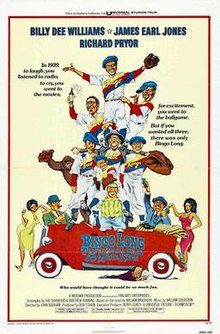
Leroy Robert "Satchel" Paige was an American professional baseball pitcher who played in Negro league baseball and Major League Baseball (MLB). His career spanned five decades and culminated with his induction into the National Baseball Hall of Fame.
The Negro leagues were United States professional baseball leagues comprising teams of African Americans. The term may be used broadly to include professional black teams outside the leagues and it may be used narrowly for the seven relatively successful leagues beginning in 1920 that are sometimes termed "Negro Major Leagues".

Joshua Gibson was an American baseball catcher primarily in the Negro leagues. Baseball historians consider Gibson among the best power hitters and catchers in baseball history. In 1972, he became the second Negro league player to be inducted in the National Baseball Hall of Fame.
John MacDonald Badham is an American film and television director. He is best known for directing the films Saturday Night Fever (1977), Dracula (1979), Blue Thunder (1983), WarGames (1983), Short Circuit (1986), Stakeout (1987), Bird on a Wire (1990), The Hard Way (1991) and Point of No Return (1993). He is a two-time Primetime Emmy Award nominee, a two-time Hugo Award nominee, and a Saturn Award winner. He is also a Professor at Chapman University.
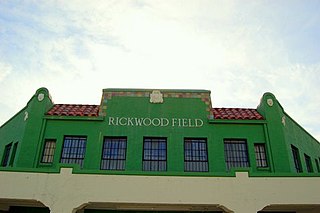
Rickwood Field, located in Birmingham, Alabama, is the oldest professional baseball park in the United States. It was built for the Birmingham Barons in 1910 by industrialist and team-owner Rick Woodward and has served as the home park for the Birmingham Barons and the Birmingham Black Barons of the Negro leagues. Though the Barons moved their home games to the Hoover Met in the suburbs, and most recently to Regions Field in Birmingham, Rickwood Field has been preserved and is undergoing gradual restoration as a "working museum" where baseball's history can be experienced. The Barons also play one regular season game a year at Rickwood Field. Rickwood Field is listed on the National Register of Historic Places.

Leon Lamar Wagner was an American professional baseball left fielder who played Major League Baseball (MLB) for the San Francisco Giants, St. Louis Cardinals (1960), Los Angeles Angels (1961–1963), Cleveland Indians (1964–1968), and Chicago White Sox (1968). He batted left-handed and threw right-handed.

The Birmingham Black Barons were a Negro league baseball team that played from 1920 until 1960. They shared their home field of Rickwood Field in Birmingham, Alabama, with the white Birmingham Barons, usually drawing larger crowds and equal press.

The East–West All-Star Game was an annual all-star game for Negro league baseball players. The game was the brainchild of Gus Greenlee, owner of the Pittsburgh Crawfords. In 1933 he decided to emulate the Major League Baseball All-Star Game, using Negro league players. Newspaper balloting was set up to allow the fans to choose the starting lineups for that first game, a tradition that continued through the series' end in 1962. Unlike the white All-Star game which is played near the middle of the season, the Negro All-Star game was held toward the end of the season.

Luther Williams Field is a baseball stadium in Macon, Georgia. It was built in 1929 on the site of an earlier ball park, and is the centerpiece of Central City Park in Macon. It is the home of the Macon Bacon, a wood-bat collegiate summer baseball team in the Coastal Plain League. The original covered grandstand is still in place, though a new tin roof has replaced the former wooden one. A black iron gate surrounds the field, the front of which says "Macon Base Ball Park."
The Mineola Black Spiders, also called the Texas Black Spiders, were an independent, generally all-black baseball team. They originated in and were loosely based from Mineola, Texas.
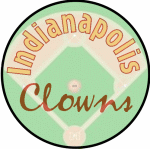
The Indianapolis Clowns were a professional baseball team in the Negro American League. Tracing their origins back to the 1930s, the Clowns were the last of the Negro league teams to disband, continuing to play exhibition games into the 1980s. They began play as the independent Ethiopian Clowns, joined the Negro American League as the Cincinnati Clowns and, after a couple of years, relocated to Indianapolis. Hank Aaron was a Clown for a short period, and the Clowns were also one of the first professional baseball teams to hire a female player.
Stan Shaw is an American actor. He began his career performing on Broadway musicals Hair and Via Galactica, before making his feature film debut appearing in Truck Turner (1974). Shaw later appeared in films such as The Bingo Long Traveling All-Stars & Motor Kings (1976), Rocky (1976), The Boys in Company C (1978), The Great Santini (1979), Runaway (1984), The Monster Squad (1987), Harlem Nights (1989), Fried Green Tomatoes (1991), Rising Sun (1993), Cutthroat Island (1995), Daylight (1996) and Snake Eyes (1998).
In athletics terminology, barnstorming refers to sports teams or individual athletes who travel to various locations, usually small towns, to stage exhibition matches. The term is primarily used in the United States. Barnstorming teams differ from traveling teams in that they operate outside the framework of an established athletic league, while traveling teams are designated by a league, formally or informally, to be a designated visiting team.
The 1948 Negro World Series was the championship tournament for the 1948 season of Negro league baseball. It was the seventh edition of the second incarnation of the Negro World Series and the eleventh overall played. It was a best-of-seven playoff played between the Homestead Grays of the Negro National League and the Birmingham Black Barons, champions of the Negro American League. The Homestead Grays played home games in both Washington, D.C., and Pittsburgh. It was the fifth appearance for the Grays in the Series, the most for any team; Birmingham made their third appearance in the Series, with each being against the Grays. The Grays won the series in five games. The Black Barons featured the 17-year-old Willie Mays in his first professional season.
The Memphis Red Sox were an American Negro league baseball team that was active from 1920 to 1959. Originally named the Barber College Baseball Club, the team was initially owned and operated by Arthur P. Martin, a local Memphis barber. In the late 1920s the Martin brothers, all three Memphis doctors and businessmen, purchased the Red Sox. J. B. Martin, W. S. Martin, and B. B. Martin, would retain control of the club till its dissolution in 1959. The Red Sox played as members, at various times, of the Negro Southern League, Negro National League, and Negro American League. The team was never a titan of the Negro leagues like wealthier teams in northern cities of the United States, but sound management lead to a continuous thirty-nine years of operation, a span that was exceeded by very few other teams. Following integration the team had five players that would eventually make the rosters of Major League Baseball teams and two players that were inducted into the Baseball Hall of Fame.
William Brashler is an American author and journalist. He is best known for writing The Bingo Long Traveling All-Stars and Motor Kings, which was published in 1973. A film adaptation, directed by John Badham and starring Richard Pryor and Billy Dee Williams, was released in 1976. Bingo Long was chosen as one of the top 100 sports books of all time by Sports Illustrated, in 2002. The 20th anniversary edition of the book included a preface by sports historian Peter C. Bjarkman.
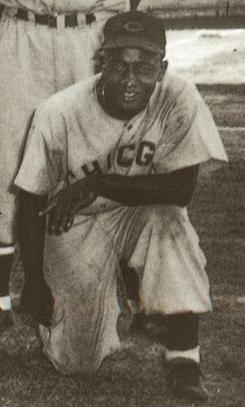
Winfield Scott Welch, nicknamed "Gus" and "Moe", was an American Negro league outfielder and manager. Welch spent most of his playing career with minor Negro teams. He is best known as a successful manager, lauded by some as "the Connie Mack of Negro baseball"
Alvin "Bubber" Gipson, Sr. was an American Negro league pitcher in the 1940s. A native of Shreveport, Louisiana, Gipson spent most of his career in Birmingham as a mainstay of the Black Barons' pitching staff.
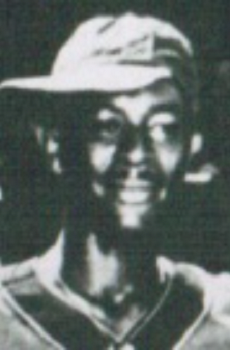
Edward Arnett Davis, nicknamed "Peanuts", was an American Negro league pitcher in the late 1930s, throughout the 1940s, and into the early 1950s. He sometimes used the pseudonym "Peanuts Nyasses" when playing baseball for iterations of the Clowns in Miami, Cincinnati, and Indianapolis. He was often called the "Clown Prince of Negro Baseball" by sportswriters who saw him play. But the sportswriters also acknowledged that in addition to clowning, he was considered "one of the top pitchers in Negro baseball;" in fact, many fans, believed he was as talented as the much better-known Satchel Paige. Davis was also praised for his versatility. "He’s a brilliant hurler...and a standout also if stationed anywhere in the outfield or infield."
